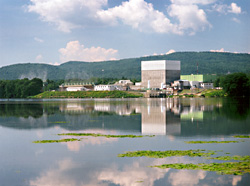Fission Stories #153
On August 27, 2013, the owner of the Vermont Yankee nuclear plant near Brattleboro, VT announced its permanent closure. Four other reactors–Crystal River Unit 3 in Florida, Kewaunee in Wisconsin, and the two reactors at San Onofre in California–permanently closed earlier in 2013. There’s a reminder for local and state officials in this series of nuclear plant closures: while the moment that a nuclear plant closes may be uncertain, it is absolutely certain that every nuclear plant will permanently shut down.
More than two dozen nuclear power reactors have permanently shut down. With very few exceptions, the rule has been that the closures have been largely unexpected and before the reactors’ operating licenses expired. These nuclear “surprises” forced local and state officials to cope ad hoc with thorny problems associated with reduced tax revenues and worker unemployment.
Nuclear power plants are not immortal. It is guaranteed that all will someday shut down permanently. But there are no guarantees that their shut down dates will be announced far enough in advance to enable local and state officials to develop and implement plans to facilitate the transition of the area into its post-nuclear life.
Given the certainty about the uncertain lifetime of the neighborhood nuclear plant, it would be prudent for local and state officials to develop and periodically review/revise response plans for the plant’s closure. Such plans could cover topics like job retraining programs aimed at retaining as much of the plant’s work force in the community as possible, revenue contingency plans aimed at lessening the impact from reduced taxes and fees collected from the plant, and proposed infrastructure expansion/upgrade projects potentially affected by the plant’s closure.
Our Takeaway
Local and state officials repeatedly demonstrate considerable skills juggling varying constituent needs in the face of budget challenges. The string of nuclear plant closures in 2013 reveals the need to apply those skills to planning for the eventual closure of nuclear plants. For that day will come and pre-planning can make the days following it less stressful, impactful, and consequential.
“Fission Stories” is a weekly feature by Dave Lochbaum. For more information on nuclear power safety, see the nuclear safety section of UCS’s website and our interactive map, the Nuclear Power Information Tracker.

